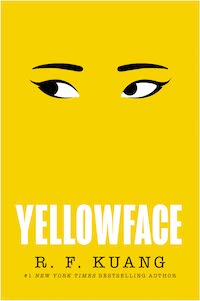Yellowface Is an Addictive, Uncomfortable Evisceration of Modern Day Publishing

It seems safe to say that R.F. Kuang’s Yellowface is like no other book you’ll read this spring. Possibly in the whole of 2023 entirely. It’s addictive, shocking, compelling, ridiculous, and extremely fun to read by turns. It wrestles with hot-button topics in publishing surrounding race, classism, white privilege, and tokenism. And its unlikeable lead characters will not only leave you wondering who—if anyone—we’re meant to be rooting for, but how potentially complicit we are in upholding publishing’s worse tendencies by reading a book called Yellowface in the first place. What I’m saying is, this book is a whole lot, and whether or not it is a book for you is probably going to have to be adjudicated on a case-by-case basis.
The story follows June Hayward, a struggling white author whose debut novel didn’t do so well and who is battling a bad case of writer’s block while working on her second. She’s incredibly jealous of her supposed “friend”, Athena Liu, a successful Chinese-American classmate from Yale who has racked up global accolades for her writing about the Asian diaspora and landed a movie deal for her latest novel. But when Athena dies in a freak accident, June steals her unfinished manuscript—a historical story about Chinese day laborers in World War I—and passes it off as her own, rebranding herself as “Juniper Song” to sound more culturally interesting in the process. The book sells in s six-figure deal, rockets up the bestseller list, and suddenly “Juniper” has the success and critical acclaim she’s always longed for.
But on the heels of her triumph, cracks begin to form. Readers and online trolls start to pick apart cracks in her story and statements made during public appearances. Juniper’s writer’s block hasn’t abated, meaning that when her agent starts to clamor for her next big hit, she has nothing to give him. And she can’t shake the feeling that someone, somewhere must realize the truth of what she’s done—a truth given terrifying form when an anonymous social media account begins accusing her of plagiarism. Tweetstorms, threats of cancelation, backlash, half-baked not-apology apologies, panic attacks, death threats, and doubling down ensue, all told through the perspective of an unreliable narrator that even the book itself acknowledges is basically a racist, self-righteous, untalented hack.

That Yellowface will inevitably be one of the spring’s buzziest and most controversial novels seems like a foregone conclusion. In many ways, that reaction will be deserved: The book is almost compulsively readable, and its plot is fast-paced and relentless. You’ll find yourself promising just one more page the same way you always mean to spend just one more minute scrolling through your Instagram reels or Twitter feed. There’s an element of voyeurism here that’s hard to resist—the vibe is very “yes, finally, someone’s telling it how it is about the way publishing really works!”—-and, admittedly, it’s always kind of fun to watch an unlikeable character like Juniper exploit an unfair system for her own gain and be so unapologetic about it.
-

-

-

-

-

-

-

-

-

-

-

-

-

-

-

-

-

-

-

-

-

-

-

-

-

-

-

-

-

-

-

-

-

-

-

-

-

-

-

-








































